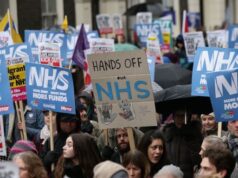Issue: 43
December 2016
This occasional newsletter is researched, written and edited by a group of concerned residents in Ealing, West London who want to preserve our NHS. We view the wholesale engagement of private, for-profit healthcare service suppliers as unnecessary, profligate and dangerous. Process improvement is what is needed in our NHS – not revolution.
Former NHS Commissioning Boss Says STPs are a Mess
Julia Simon left her post as Head of Commissioning Policy Unit, NHS England in September 2016. On 1 December 2016 she spoke at a public meeting in Brent organised by Brent Patient Voice. She gave a very clear description of the recent history of State healthcare and social care services in England. She gave credit to Simon Stevens (NHS boss) for creating his Five Year Forward View (FYFV) in October 2014 that all relevant partners agreed with. The 44 draft Sustainability and Transformation Plans (STPs) attempt to implement the FYFV across England. The FYFV/STP aspirations are all about treating more patients in the community or at home instead of in hospital and integrating healthcare and social services.
Ms Simon is concerned that the STPs’ content and the STP processes are flawed. She says it’s all about saving money. Where’s the evidence she asks that the proposed changes will improve healthcare and social care and will significantly reduce costs? The timescales for reducing costs and for producing the STPs are very tight. Are they realistic? She’s also worried about the lack of engagement with patients and the public in the creation of the STPs. She has recently reviewed a number of draft STPs and she questions how decisions have been made and how priorities have been set.
Julia believes that creating a market in healthcare was a mistake. She also believes that care homes becoming private is having a devastating effect. Government reductions in social care funding are resulting in cost cutting in care homes and the consequential decline in quantity and quality of care.
Julia Simon has taken a brave stance in not only resigning from the NHS STP hierarchy but speaking out about her STP concerns. Let’s hope she’s not the last senior NHS leader to realise that they are on the wrong side of the argument.
Northolt GP Surgery to be Closed Down. NHS England Says It’s Too Small
The Broadmead Surgery in Northolt, Ealing is highly regarded by patients and staff. It has a very active patient Participation Group and it also runs a carers’ group. The surgery is operated by Dr James Swain who is a young and innovative GP. He opened his surgery in 2010.
NHS England and Ealing Clinical Commissioning Group (ECCG) want to close down the surgery. They say it doesn’t have enough patients and if it were to be closed other local GP surgeries could benefit from absorbing Dr Swain’s patients.
It seems that ‘Big Is Beautiful’ for GPs in the coming world of STPs. What is planned is for federations of GPs to work with NHS Trusts, CCGs and Local Authorities in Accountable Care Partnerships (ACPs). These ACPs will be private consortia providing care ‘at scale’ for 100,000s of patients in long term fixed price contracts.
Suffice to say that Dr Swain and his patients are fighting vigorously to save their invaluable ‘small’ healthcare service.
Hammersmith & Fulham Council Begin Legal Action Against the NW London STP
Hammersmith & Fulham (H&F) Council Leader Stephen Cowan announced at a 29 November 2016 public meeting that the Council had submitted a ‘pre-legal action letter’ re the NW London STP to the NHS CCG in early November. We understand that Ealing Council is supporting this action. It’s rumoured that the grounds being claimed for Judicial Review are the lack of consultation/engagement. H&F Council has been threatening legal action ever since it refused to formally sign up to the draft NW London Sustainability and Transformation Plan (STP) in June 2016.
The public meeting ‘Save Charing Cross and Ealing Hospitals’ was organised by H&F Council and attracted hundreds of attendees in Hammersmith Town Hall. An intriguing platform speaker was a local GP, Dr David Wingfield. He is the Chairman of the H&F GP Federation. The Federation represents the interests of all GPs working in the 30 H&F GP surgeries. Dr Wingfield was sceptical about the achievements of 2012 NHS NWL SaHF project and some of the NWL STP. He felt that saving Charing Cross Hospital was not enough – something had to be done with the local GP service as it was ‘all over the place’. He mentioned that the Federation was working with the NHS West London Mental Health Trust, the NHS Imperial College Healthcare NHS Trust and the local Healthwatch. However what he didn’t say was that this ‘working with’ is the precursor to the formation of a private consortium involving these bodies and others to create an Accountable Care Partnership(ACP). This consortium will be granted a £billion+, 10 year, fixed price contract to deliver specific care services to a specific population of hundreds of thousands of residents. These NW London ACPs, being fixed price, will be the means by which annual care costs will be reduced by over 25% (£1.3 billion) by 2020/21. It’s not clear to whom this ACP – or indeed any ACP – is accountable.
Of course none of these ACP details are contained in the NWL STP. I’ve glanced at another five STPs and the ACP details are not specified in these either. This means that legal action against STPs based on the legitimacy and accountability of ACPs is probably impossible.
NW London Hospital A&E Units Failing Patients
Latest NHS figures for September 2016 show that Hillingdon Hospital A&E provided the worst service for seriously ill (Type 1) patients in the whole of England. The combined Type 1 figures for Northwick Park Hospital and Ealing Hospital A&E units were 11th worst nationally. Charing Cross and St Mary’s Hospitals’ combined A&E performance came out 12th worst.
NW London A&E performance plummeted in September 2014 following the closure of both Central Middlesex Hospital and Hammersmith Hospital A&E units. Since this date A&E performance throughout NW London has never materially improved.
This consistent poor performance is all the more worrying given the fact that there has been no increase in demand for A&E services in NW London since at least Spring 2013 (when NHS A&E performance data was first extracted and analysed).
Thanks to Colin Standfield for continuing to extract and analyse this NHS data.
Consternation Across England About Proposed or Suspected Healthcare and Social Care Cuts and Closures
Across the whole of England secret plans are being drawn up in an attempt to improve healthcare and social care services and to cut annual spending on healthcare and social care by £22 billion by 2020.The financial savings are seemingly to be achieved primarily by reducing the number of Major Hospitals and A&E units, increasing care for people in the community or at home, illness prevention, integrating healthcare and social care, changing the roles of GPs and setting up consortia of private and public bodies to deliver all our care services. Sustainability and Transformation Plans (STPs) are to be the instruments of this austere care delivery reformation.
Locally, regionally and nationally there is a growing fury about the known content and suspected content and implications of the 44 STPs. Apparently all draft plans were submitted for review to NHS England by 21 October 2016. So far 38 drafts STPs have been published or have leaked into the public domain or to the press. Some of these are June 2016 versions and some are 21 October 2016 drafts. By far the most analysed June 2016 draft STP is the one for NW London. At least four substantial reports on the NWL STP have been written and published. The London Boroughs of Ealing and Hammersmith & Fulham commissioned John Lister, Roger Steer and Sean Boyle to write a report, Brent Patient Voice authored a report and Save Our Hospitals:Hammersmith & Charing Cross and Healthwatch Ealing have also published reports.
I have attended two national demos/ rallies, two national meeting of the Health Campaigns Together alliance and a national meeting of Keep Our NHS Public in recent months. The topic was STPs. STP activists variously attended from Yorkshire, Cornwall, Birmingham, Liverpool, Manchester, Oxford, Grantham, Brighton, Sussex, Derbyshire, Hampshire, Isle of Wight, Banbury, Hampshire, Shropshire and of course from all over London.
So far 13 Local Authorities (LAs) have refused to sign off/endorse their regional STPs. These are in South West London, North West London and West Yorkshire. They are Croydon, Kingston, Merton, Richmond, Sutton, Wandsworth, Ealing, Hammersmith & Fulham, Leeds City, Bradford, Kirklees, Calderdale and Wakefield. These refusals are probably symptomatic of the administrative and financial conflicts inherent in attempts to integrate NHS free at point of use healthcare services with means tested LA delivered social care services. Proposals to downgrade Major Hospitals and close hospital A&E units are also a very big factor.
On 14 November 2016 STP concerns were featured on BBC TV and ITV. On 21 November a critical study of 42 of the STPs by the doctors’ Union – the BMA – featured in the ‘Daily Telegraph’, ‘Daily Mail’ and the ‘Daily Mirror’.
Most citizens in England know few facts about the STP intentions for their communities as their draft regional STPs have not been published. The regional draft plans which have been published are difficult for lay people to understand. They contain lots of undefined acronyms and unexplained initiatives. They are filled with laudable aspirations about improving everyone’s health and welfare. There is very little information in any of them about how the variously labeled future private consortia of NHS bodies, GP federations, Local Authorities and private care companies will operate. These future bodies are variously referred to as Accountable Care Organisations (ACOs), Accountable Care Partnerships (ACPs), Multispeciality Community Providers (MCPs) and Primary and Acute Care Systems (PACS). It will be these new, untested bodies – operating under fixed price, 10 or 15 year contracts – who will exclusively deliver all public care services in the future and who will be charged with slashing costs – to achieve a 25+% reduction in annual care costs by 2020/21.
From what people have gleaned from the contents and intentions of STPs, here’s a flavour of some of their concerns:
+ The changes proposed will not be effective and our care services will deteriorate
+ The high level of secrecy around the creation of the STPs has made many citizens suspicious about their true aims and objectives
+ The loss of Major Hospitals and hospital A&Es will result in increased pain and death
+ Loss of hospital beds
+ Increased time/distance to travel for acute care is unacceptable
+ Financial cuts will inevitably involve reducing the numbers of care staff
+ No confidence that there will be effective integration of healthcare services and social care services
+ The role of ACOs is completely underplayed and unexplained in the STPs
+ There are currently serious doubts as to the financial sustainability of Local Authority social care services – and STP cost cutting does nothing to alleviate these doubts
+ No evidence that replacing acute hospital care with out-of hospital care – in the local community or at home – will be effective or will cut costs
+ Cost cutting will result in reductions in the quality and quantity of care
+ STPs describe the greatest proposed changes to the NHS since its formation in 1948 yet they have not been debated in Parliament and they are not mandated in any Parliamentary Act
+ Lack of capital funding
+ Mental health care services will deteriorate
+ Some hospital Maternity units will close
+ Some hospital Cancer units will close
+ De-stabilisation of GP practices – with increased GP workloads and possible reductions in GP funding and the GP surgery population
+ STPs will create ACPs which will contractually bind together Commissioners and Service Suppliers as peers in long term commercial agreements. These arrangements completely trash the Health and Social Care Act 2012 regulations which mandated ‘master’ and ‘slave’ relationships between Commissioners and Service Suppliers.
+ Without significant funding and additional healthcare beds and social care beds the care needs of the growing elderly population will overwhelm the care system
+ ACPs will take budget and financial management responsibility away from CCGs and Local Authorities
+ Little information about social care services ‘transformation’
+ Recent local attempts at cutting costs and ‘improving’ care services have been unsuccessful
+ No engagement with citizens during the formative process of plan making




